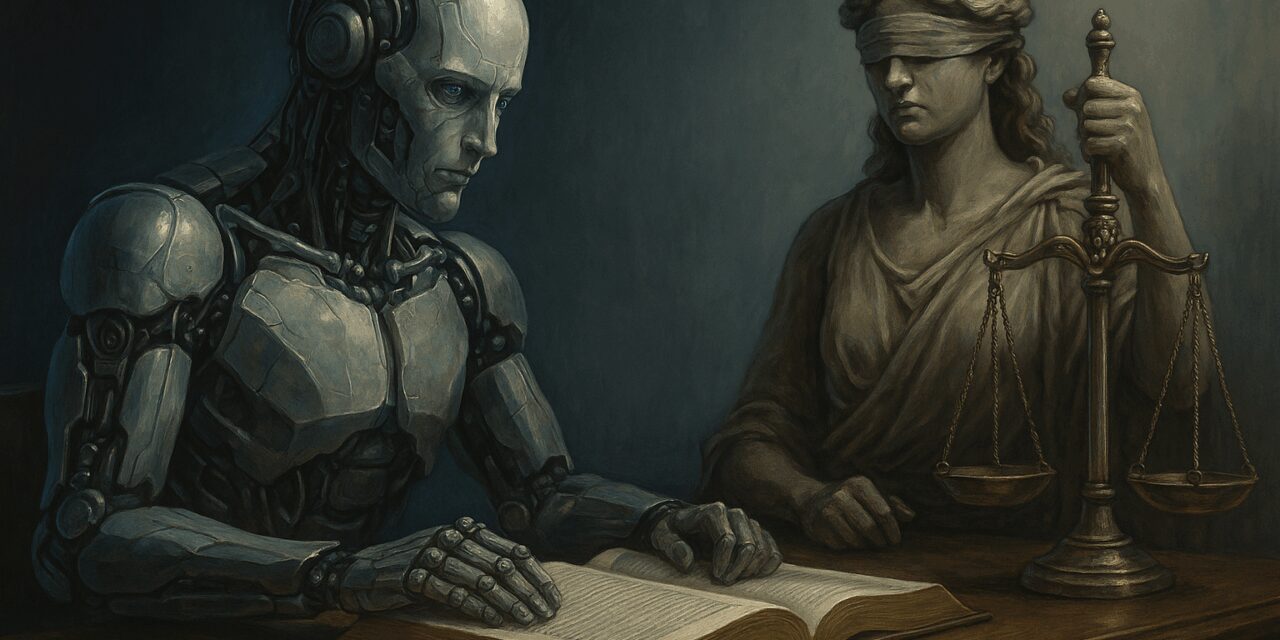In the first instalment of his latest legal column, Patrick Laure reflects on the rise of artificial intelligence in the legal world, tracing its roots, questioning its reach, and reminding us that while machines may reason, only humans can feel…
Civil case
Negotiation & Settlement, prior to trial
As part of the integration of AI (I), putting into perspective the legal profession, which is destined to be replaced by AI (II), I would like to share with you an anecdote applicable to a case I dealt with in the Principality of Monaco (III).
While I was listened to my client, his hands swollen from working as a labourer, he expressed his distress to me regarding those against whom he harboured a grievance. He felt wronged, cheated, but above all despised; with his hands and nails dirty from the earth, he was no match for his detractors, with their manicured nails. It was a case of David versus Goliath. I had to defend him, noblesse obliges.
I / AI, genesis.
Artificial Intelligence is to Man 2.0, what prose is to Monsieur Jourdain (1).
- Molière. Le Bourgeois Gentilhomme
We have been using Artificial Intelligence without knowing it for over 40 years.
Conceptualised in the 1980s, CRM (Customer Relationship Management) is the first AI made available to us, ‘without our knowledge or consent’, as Richard Virenque would have said.
CRM, the ancestor of AI, is a software that allows commercial enterprises, after approval and implementation of data reflecting the tastes and desires of prospects or customers, to send them offers, using the martial language of ‘targeted’ offers.
I am 30 years old, and I smile at this; it is too late for me, I have already discovered and embraced my tastes. At best, CRM will confirm what I like; at worst, I will be annoyed by repeated offers, bis repetita non placent. “Je n’ai besoin de personne en Harley Davidson »(2)
- Brigitte Bardot’s song
But what will happen to young people aged 10 to 20? They will be categorised against their will, when they are only just beginning to discover themselves, and nothing is slower than the birth of a human being.
Not yet fully formed, children and adolescents that they are, through the use of Artificial Intelligence, they risk being unable to develop their critical thinking, nurture their free will, and encounter and get to know their imagination.
Could they become artificial souls, wondering with whom to interact, with whom to talk? If not the CRM, now in the form of algorithms, which will have been imposed on them, worse still, implanting a personality that is only a reflection of their natural construction in the making, if not imperfection.
In 2002, I moved to a new town. When I provided the information requested by the town hall to register as a new resident, the local hairdresser found out my date of birth through my personal information.
On my birthday, I received a beautiful birthday card in the post, accompanied by a ‘gift voucher’ for a haircut. The hairdresser has a great CRM system, but I’m bald. If Yul Brynner hadn’t existed, I would have sued for defamation.
In 1996, after Kasparov won the first match against Deep Blue, Deep Blue won the second match against Kasparov. Surprisingly, Deep Blue did not win the first match. Could Kasparov have fed Deep Blue pure intelligence? Another match was enough to reverse the situation, and the machine defeated the man.
Clearly, Deep Blue was well-born; all it took was a small correction for the student to surpass his master. But thank you, Kasparov, because without your contribution to the first game played, Deep Blue would have remained perfectible forever.
Deep Blue was aimed at the elite, so it was rare to come across it. The AI that was aimed at everyone was the HP 12C or Sharp 1500 calculators, which were banned from baccalaureate exams in 1997.
In 1998, the postal service invented the ‘ready to post’ letter, and we entered the era of ‘ready to decorate’, ‘ready to reflect’ and ‘ready to think’.
⃰
•When AI drops the mask, or the power of marketing.
While my generation embraced CRM after reaching maturity, young people aged 10 to 20, Generation Z, have been brought up on CRM. Now that they have become adults, AI must talk to them and interact with them.
AI presents itself to them as a full-fledged entity, almost endowed with consciousness, a friend you call on to ask a question because there is a problem to solve. Its name is ChatGPT, Claude Sonnet 4, DeepSeek, etc…
AI finally has its own identity: it is Skynet from Terminator, ‘I’ll be back’ (3). Terminator warned us with its subliminal metaphor. Here we are, AI is here, presenting itself to us under the name ChatGPT, Version 1, 2, 3, 4, like Terminator 1, 2, 3.
- Terminator, movie
In 2023, the New York Bar Association competition was won by Artificial Intelligence (Deep Blue version 2.0), which is now advancing unmasked.
It seems that all great minds advance masked, but clearly Artificial Intelligence is not a great mind.
In fact, it recognises this itself.
‘Although artificial intelligence can offer additional support to lawyers, it will not completely replace lawyers in the near future. The work of lawyers involves skills and human qualities that cannot be easily replicated by machines.’
So, we can rest assured that in the ‘near future’, there will still be room for lawyers. But what about the distant future? The question remains.
Patrick LAURE
Secrétaire Particulier
+33 6 35 45 27 02
laurepatrick@wanadoo.fr
**The information provided in this article is for general informational purposes only and does not constitute legal advice. It is not intended to create an attorney-client relationship. Laws and regulations vary by jurisdiction and may change over time. Readers should consult a qualified legal professional for advice specific to their situation. The author and publisher are not responsible for any actions taken based on this information.

